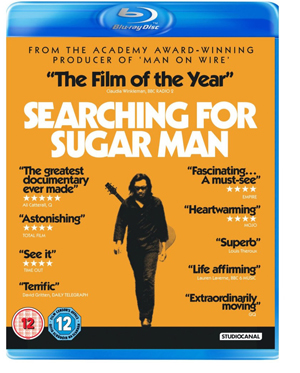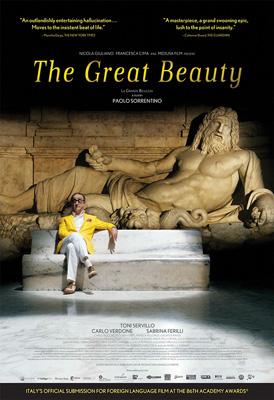 Film: Searching for Sugar Man
Film: Searching for Sugar Man
Director: Malick Bendjelloul
Genre: Documentary
?Buddhas move freely through birth and death, appearing and disappearing at will.?
Bodhidharma
?Separation penetrates the disappearing person like a pigment and steeps him in gentle radiance.?
Boy George
Why Good People Disappear From View
Had you ever heard of singer-songwriter Jesus (Sixto) Rodriguez before this film came out? I know I hadn’t, but North American anonymity didn’t keep him from being outrageously popular in Australia, South Africa, and parts of Europe even while he slaved away in Detroit, cleaning up construction sites to feed his kids. His fans were a bit perplexed at the mystery surrounding their idol, but a rumour that he’d committed suicide by self-immolation on stage just added to the allure of his music.
I’m sure you do know, as I do, at least one singer-songwriter from your hometown; someone who manifested tremendous gifts, for whom everyone had high hopes, and who even had one or two career breaks before falling off the radar.
Falling off the radar is something like falling out of the social safety net. If all the conditions aren’t exactly met, the pie gets eaten before you get there. Sadly, it isn’t just about talent.
Jesus Rodriguez was a great package. He was more handsome than Bob Dylan. He was a much better singer than Dylan, with a wonderful, sonorous voice and an enunciation that ensured you heard each carefully chosen word. His songwriting was not as prolific as Dylan’s, but neither did he produce as many self-indulgent and self-righteous songs. So why didn’t his career take off?
For one thing, the guy had a name that couldn’t be traced to Northern Europe. In 1960s America, this was still a liability?and to some extent, it still is. There’s a reason why Robert Zimmerman became Bob Dylan, why Peter Hernandez became Bruno Mars, and why Stefani Joanne Angelina Germanotta became Lady Gaga; unless your name sums up what You’re putting out there, Americans aren’t going to get you.
People just assumed that Rodriguez played Hispanic music, and Hispanic music wasn’t in.
For another thing, some of the musical arrangements on his albums were too archaic for those who might get his lyrical content; and his lyrical content was too politically defiant for those who might like the musical arrangements. Challenging social commentary didn’t quite mesh with swelling strings.
The consciousness of American mid and late ?60s radicals was not as attuned to the poverty in its own backyard as had been the minds of those of the earlier Kingston Trio set. Rodriguez’s background was Mexican-American working poor, and his songs were less about the establishment and war protests than about the real and immediate problems of DetroIt’s poor, of which he was part and parcel.
Rodriguez was a genuinely good person. He would have liked to have had a successful career, but his focus was threefold: to produce honest, well-written work informed by compassion and wisdom, to speak for those unable to speak for themselves, and to be an amazingly empowering dad to his three beautiful daughters.
These daughters recount trips to museums, art galleries, and libraries. He encouraged them to read, to think, to enrich their minds and seek answers, and to feel entitled to grasp all that the best of Western culture had to offer them and not to allow themselves to be marginalized because of their Hispanic-Native American background. This alone speaks of an admirable degree of moral integrity. But there’s more.
In spite of his keen intellect and artistic capacity, he wasn’t too proud to support his daughters by working in the construction industry, doing the work no one else wanted, cleaning up the filth and debris of demolished houses.
While the flower children were trying to compel increasingly wealthy Dylan to become the poster child of the anti-Vietnam movement, Dylan himself stalwartly refused, even saying that he wasn’t even sure he was against the war in Vietnam. Rodriguez, on the other hand, had an almost religious commitment to speaking for workers, addicts, the poor, and the oppressed.
We need to ask ourselves why, when men like this are among us, we North Americans make idols of men who abuse drugs and alcohol, cheat on their wives, and neglect their children.
Searching for Sugar Man manifests nine of the Mindful Bard’s criteria for films well worth seeing: 1) it is authentic, original, and delightful; 2) it poses and admirably responds to questions that have a direct bearing on my view of existence; 3) it harmoniously unites art with social action, saving me from both seclusion in an ivory tower and slavery to someone else’s political agenda; 4) it is about attainment of the true self; 5) it inspires an awareness of the sanctity of creation; 6) it displays an engagement with and compassionate response to suffering; 7) it gives me tools of kindness, enabling me to respond with compassion and efficacy to the suffering around me; 8) it renews my enthusiasm for positive social action; and 9) it makes me appreciate that life is a complex and rare phenomenon, making living a unique opportunity.
Wanda also penned the poems for the artist book They Tell My Tale to Children Now to Help Them to be Good, a collection of meditations on fairy tales, illustrated by artist Susan Malmstrom.


